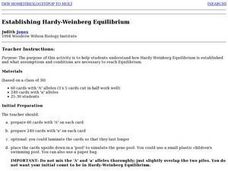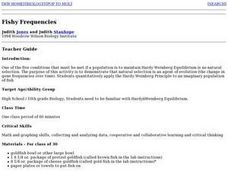Curated OER
Hardy-Weinberg Equilibrium
Students investigate how Hardy-Weinberg Equilibrium is established and what assumptions and conditions are necessary to reach Equilibrium. They model alleles using materials such as index cards, M & M's and goldfish.
Curated OER
Hardy-Weinberg Equilibrium According to Hoyle:
Students gain a feeling for the significance of the Hardy-Weinberg Equilibrium without using algebra but participating in an interactice game.
Curated OER
Establishing Hardy-Weinberg Equilibrium
Pupils study how Hardy-Weinberg Equilibrium was established and what assumptions and conditions are necessary to reach Equilibrium. They record class data on their charts. Frequencies are calculated.
Curated OER
How To Use Hardy-Weinberg to Find Gene Frequencies in s Wild Population
Students explore the gene frequency in Hardy-Weinberg Equilibrium experiments. They inquire into the studies of both black and gray squirrels. Basically the population genetics of certain squirrel populations. The species of each are...
LABScI
Genetic Equilibrium: Human Diversity
Investigate the Hardy-Weinberg Principle to explain genetic equilibrium. The 10th lesson plan of a series of 12 is a laboratory exploration of genetic equilibrium. Your classes use a mixture of beans to model allele and genotype...
Curated OER
Fishy Frequencies
Tenth graders demonstrate that natural selection is an agent of evolution. They quantitatively apply the Hardy-Weinberg Principle to an imaginary population of fish. They utilize math and graphing skills, collecting and analyzing data,...
Curated OER
Breeding Bunnies
Students learn the impact that genetics can have on the evolution of a population of organisms and become aware of the influence that the environment has onorganisms.
Curated OER
Natural Selection
Students practice calculating allele and genotype frequencies in the framework of a simple simulation using hard candy, calculators, and a worksheet. This lesson includes a three-page worksheet and an assessment question for conclusion.







